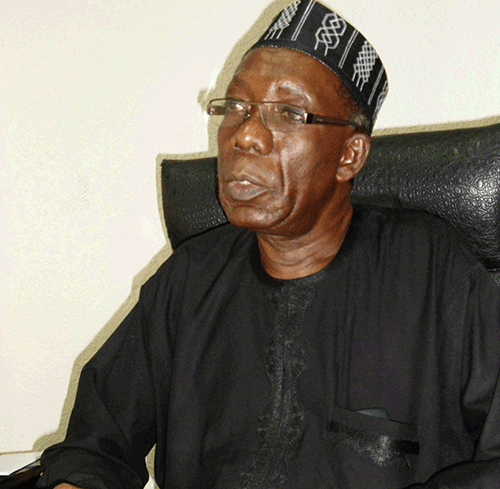Victor Eburajolo, Deputy Managing Director, Kewalram Chanrai Group, is a technocrat by all standards. The University of Lagos law graduate specialised in industrial relations, law and trade unionism. He is also a human resource expert.
Having seen it all with different textile manufacturing companies over the years, he was invited in 1993 to join the Afprint Group as a consultant to restore sanity to the company where union leaders turned into hooligans.
He was the President of Textile Manufacturers Association; and Chairman of Industrial Relations Committee of the Nigeria Employers Consultative Assembly (NECA). He also served as a member of the National Labour Advisory Council (NLAC) for about 15 years.
Eburajolo subsequently worked with the Nigeria Social Insurance Trust Fund (NSITF) where he represented the private sector. While in the NSITF, he championed the Employee Compensation Act (ECA) passed into law in 2010.
In this interview with the Assistant Business Editor, KELECHI MGBOJI, he recalled the glory days of textile manufacturing, and also spoke on other matters.
What the group is doing
Afprint and Kewalram Chanrai Group belong to the same group but are different entities. In the Kewalram Chanrai Group, we are not totally off manufacturing. We have pitched our tent in the agricultural sector, providing chemicals, blending fertiliser, assembling tractors and so on and so forth.
We have also gone into pharmaceuticals. Yes, we are into trading in Sharp products and many others. But we are also trying to add value rather than bring them in straight without adding value ourselves. That is why we bring them as completely knocked down (CKD) parts and add value and employ people.
Sorry state of textile manufacturing
If we are to go specifically on textiles, you cannot go into business for social welfare. It is the duty of the government to provide social welfare. We have done the analysis, it is not worth it because we cannot compete with textiles coming from China, Korea, India, and others.
And we know why; serious infrastructure decay. Our refineries are all gone. We don’t produce anything. We can’t repair anything and machines come from abroad. You have to import the parts and foreigners dictate to you the price they will sell. Your chemicals and most of the things come from abroad. In fact, this country is in a very sorry state.
When the refineries were started several years ago, part of the by-products of the refineries were to be used as textile chemicals and raw materials, production of man-made fibre and so on and so forth. But it is there only in the books; until the refineries grounded to a halt, they did not produce any of those other things.
We still had to import all these things; and they were coming in vessels that Nigeria had no stake in. Our national shipping line had crumbled and sold. Nigeria Airways was sold, too. And we are totally at the mercy of foreigners. There is nothing anybody can do.
We will not go into business for the sake of going into business. No! The present situation and the analysis we have done reveal that there is no way we can compete with China, Korea, and Indian textile companies as far as their fabrics keep flooding our markets. So, as of today, it does not make sense for us to go back into textile manufacturing.
Opportunities in agriculture
Huge opportunities exist in the agricultural sector. Though you might import some food items, most of them have to be grown here in the country. Nigeria is blessed with fertile soil.
I remember travelling from Lagos to Warri in the company of some Chinese when I was with a textile mill in Ikorodu. All through the journey, the Chinese were amazed by the fertile soil they saw. And they wondered why Nigeria could ever complain about food.
They said it is only in Nigeria that you throw something in the soil and it starts growing the next day. The huge potentials the country has in agriculture are baffling.
The mistake the government made which they are trying to correct was that for about 15 years, we scrapped commodity boards so that there was no standard. Everybody was doing whatever he or she wanted.
But three years ago, the government revived the commodity boards. Let us see if it is going to help because when the commodity boards were in place, they ensured that standards were met; and for cotton and cash crops, the government guaranteed minimum price. At least it was there and the government could buy from the producers then.
When nothing of that nature was happening again, farmers were discouraged. My fear is that in this country we do what I have come to regard as royal dance: one step forward and two steps backward. But hopefully, we will get there.
Rising GDP, but declining living standard
Let me explain the situation by asking you: What is the backbone of any economy? It is manufacturing. Today, China has become the factory of the world. Anything you want manufactured, you go to China.
Tell me, what are we manufacturing in this country? The real sector is gone completely. All we do now is become traders by whatever name you call it. We are all traders; we import and sell.
Until the government gets back and makes sure that the manufacturing sector is really working, we will continue to have this rising gross domestic product (GDP) but falling standard of living. Of course, our GDP is growing but how many people are being employed?
Recently somebody with a PhD was reported to have been involved in kidnapping because there is more money to make from it than picking a job that does not even exist in the first instance. We should ask ourselves: What are we really doing in this country? Where will our children get jobs?
Traders don’t employ too many people. But if we are manufacturing, you know how many people will be engaged. When Afprint was manufacturing, it had 3, 500 workers in direct employment.
I like to use the textile industry as example because it is my background. At a time in this country, textile mills had 80,000 workers in direct labour, not to talk of contractors and those who supplied materials to the companies.
But today, it is all gone; a few of them that are operating cannot employ more than 3,000 workers combined.
Banks and credit facility for manufacturing
Our financial institutions are not helping matters either. You go to them for loan for manufacturing purposes, to import machines, forget it. They will rather give funds to those importing fuel because they will get their interest almost immediately.
But I don’t blame the banks because they are there to do business. Their calculation is that if they give you money to set up an industry, you are looking at 10 years down the line to start making profit. Or maybe with improvement in technology you might start making it in two and a half years.
Which bank wants to do such a business? Maybe the Bank of Industry (BOI). Then how much can the BOI give? Of course, the BOI is doing the very best it can, but Nigerians are smart. They take the money from the BOI and you don’t know where it gets to. We are very intelligent but most times our intelligence is applied negatively.
Labour and management of pension funds
It is reasonable to have a representative of organised labour in the management of pension funds in the sense that this was the practice in the NSITF in 2002. I was there representing the organised private sector.
We had somebody who was representing the NLC. He had no link with the NLC but at least there was the NLC quota he was occupying to balance up things.
I know I was representing the organised private sector where collection was coming from, but I opted to be Executive Director (ED) Operations, not ED Administration.
In fact, somebody asked me why ED Operations? Why not ED Administration? And I replied that I didn’t want to buy anything or give any contracts. My constituency is the one from which the money was coming and members of my constituency are those that should benefit first.
I would bring in the money and when there was payment to be made, I ensured they would get it.
But go and check today, those directors, in-house members of the executive committees in most of these parastatals, are either coming from the Presidency or a minister is keeping his boy there. And guess what they do with the fund that is for the private sector. They have nothing at stake. Why would they?
But if you have somebody representing the unions and somebody representing the employers and others, their constituencies will ask them what they have done.
So, it is necessary that any of these issues that have to do with employees, that organised labour be represented. As to whether there is going to be good representation, it is a different matter. But at least let that quota be there so that their constituency will hold them responsible if anything goes wrong in the system.
If anything goes wrong with the ECA now, who are you going to hold responsible in the private sector? You may tell me there is somebody on the board of directors from NECA or the NLC. I am on the board and we take decisions but what goes on after, you don’t know.
The main thing is to be in the top management of such organisations which position allows you to render account to the constituency you represent.
Pension funds and impunity of fraudsters
The system has made people who should bow their heads in shame to become bold. It was reported in the dailies some time ago that somebody was jailed for six months for stealing about N7,000 whereas the one who stole about N26 billion was given an option of fine.
It has become a street slogan of late that somebody who wants to steal should steal big so that if you are caught, you take care of those handling the case and still go home with a substantial amount of money.
If not so, why would somebody being tried for stealing huge sums of money get thugs to work for her and harass journalists?
It is the level of degeneration we have got into. People in this country have no shame any more.
In every human being, there is a little larceny but you must be able to put it down. If you allow it to burst once, it gets bigger and bigger, and the appetite gets bigger and bigger. In those days if you ever heard of somebody asking for bribe, the maximum was 10 per cent. But today, they even ask for 90 per cent.
What kind of human being, a director, would maintain in one bank account the sum of N1.1 billion? So who is working for whom? I am not saying that there is no corruption in the private sector but they can hardly get away with it.
The rules are clear; it doesn’t matter who you are, if you are caught – check most of the collective agreements – stealing, fraud, you are fired and there goes your gratuity.
The only thing you can get is if there is contributory pension, you go and get your contributory pension. What kind of country are we running?

















